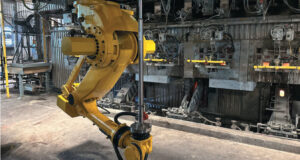Just beside Bordeaux’s revitalized city center, Papeterie de Bègles produces paper for plasterboard made from 100 percent recycled furnish. This surface “facer” and back paper are critical for the quality and performance of plasterboard brands from Etex Building Performance (EBP), their customers, and parent company Etex, an international building products company.
Today, the Bègles mill’s 180 g/m2 ivory grade meets higher quality requirements, especially tear and tensile strength. Grey and color grades are also more consistent, and are produced with greater stability and efficiency.
“Very old double disc refiners, operating in duo and monoflow modes, were an obstacle to quality at Bègles—especially regarding paper mechanical strength, which is a key parameter in terms of specifications to be guaranteed for our final end product: ‘plasterboard’ within the group. In fact, poor fiber fibrillation and too much cutting prevented us from fully reaching our objectives,” says Sébastien Wery, quality and process manager at EBP International.

Pascal Petit inspects a roll. Strength requirements are very specific for both the facer and back paper of plasterboard.
Strength of the facer and back paper of plasterboard has very specific requirements, including the way paperboard and the gypsum paste bond together. “We decided to bring in AFT for expertise, knowing that their Finebar plates might help us improve mechanical properties, especially strength. A sequence of trials of Finebar MiniSegment patterns exceeded expectations.”
TECHNICAL APPROACH
The Bègles mill began more than 100 years ago right on the Garonne River. The old and new are evident in buildings and equipment. The mill’s strength overall is keeping an eye on innovation and employing science to continuously improve processes and products. Training is evident in the employees, who are upbeat and open.
Close collaboration around a specific target was the platform for making strides and continuously improving the mill’s OCC-based pulp. The Bègles team, the EBPI Quality & Process team, AFT, and the CNRS laboratory in Grenoble, France (LGP2), worked together to improve quality by making notable changes in refining practices.
Wery, who has long been a Black Belt Lean Six Sigma holder, is vigilant about collecting facts and employing scientific methodology. “When something is not working, you need to try new avenues of improvement, or go back to previous situations —and then try again a little differently. It’s fun when the whole team is motivated and focused.”
Continues Wery, “The singular dramatic difference to optimize our end products was Finebar. AFT helped us discover a specific design of MiniSegments that delivers much-needed mechanical properties. Our lightweight plates also last longer and are easy for operators to change, giving advantages for maintenance and safety.”
IMPROVEMENT IN FIBRILLATION
With a custom-designed AFT Finebar pattern, Bègles has reduced unwanted short fibers, increased fiber fibrillation, and improved the end product properties of EBP’s plasterboard products. Such results on the plasterboard properties are linked to better process stability, because fewer adjustments are performed to keep the mechanical strength above the minimum value in terms of paper specifications.
All of the Bègles mill’s DD refiners now operate with optimized Finebar patterns, delivered as MiniSegments.
Comments Claus Grunow, AFT’s refining team leader in Europe: “OCC at Bègles is of relatively low quality with a fiber length between 0.8 and 1.2 mm. This means that low intensity refining is needed to achieve the target properties of the paper.”

Fig. 1: The mill has recorded major energy improvement, because fewer refiners run at any given time, producing the same or greater output.
Making the most of OCC begins with close observation and analysis of the fiber. Long fiber is gold for Bègles, so they accept or reject truck loads based on this criterion. “Kraft paper gives us mechanical strength. With AFT we ensure good fibrillation and avoid cutting the fibers too much. We keep more length,” says Wery.
“Trials were performed with various patterns by evaluating the data from refining curves. Such curves allowed for selection and implementation of the best refining patterns for optimal refining results,” Grunow says.
From a practical standpoint, Bègles has a “make and hold” agreement with AFT Finebar. This arrangement stores plate sets in Varkaus, Finland. The plate sets are available on demand, which assures a reliable delivery process.
Adds Grunow, “We regularly review the performance of the refiners and refiner plates with the Bègles team. Through such efforts we can optimize the refining patterns and also improve the refining process conditions.”
Ongoing projects include efforts to add even longer life to refiner plates and better understand plate wear. To assure equal pulp flow in the duoflo refiners, a feed piping system is under review for both refining zones.
Major energy improvement has been recorded, because fewer refiners run at any given time, producing the same or greater output (see Fig. 1).
WHAT’S AHEAD?
“AFT Finebar, advances are largely about technical expertise and open thinking. They looked at our processes. They thought about how to improve our refining—all the way to our plasterboard making. Other creative ideas, based on scientific evidence, continue to push our team further,” concludes Wery.
 Paper 360
Paper 360
